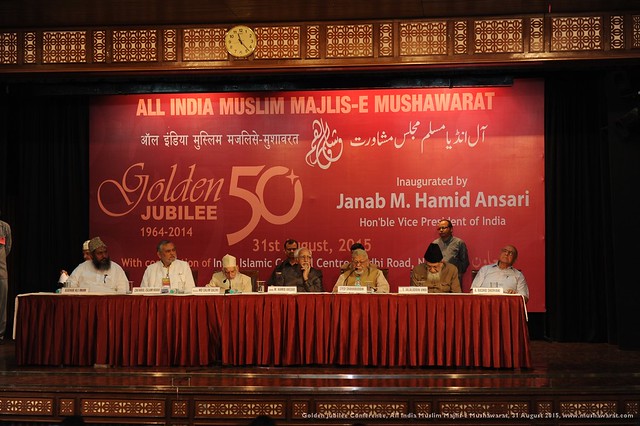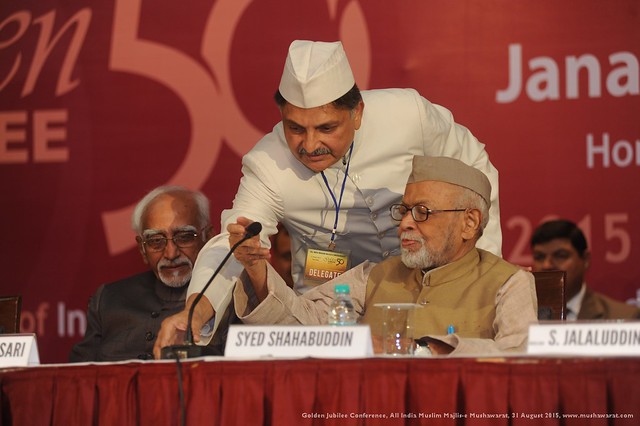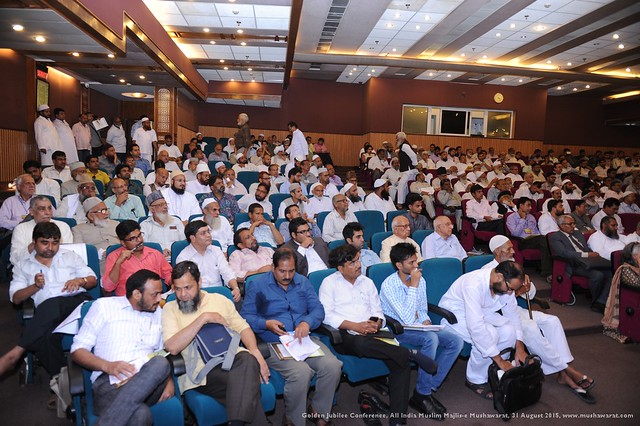By Abhay Kumar for TwoCircles.net,
Communal violence, exclusion and assaults on religious freedom were listed as major issues before Indian Muslims during the Golden Jubilee function of the All India Muslim Majlis-e- Mushawarat (AIMMM).
Held on a bright Monday, August 31, in New Delhi’s India Islamic Cultural Centre, the function was attended by hundreds of Muslim intellectuals, heads of community organisations, religious and political leaders, diplomats, journalists, students and civil society members.

Mushawart golden jubilee celebration on August 31, 2015 at IIC, New Delhi (Courtesy: AIMMM)
Inaugurating the function, Vice-President, Hamid Ansari, too, shared the broader concerns of the AIMMM. During his speech, he raised the issue of “identity and security”, “education and empowerment”, calling for an “equitable share” in the largesse of the state” and a “fair share” for Muslims in decision-making”.
He, therefore, asked the government to launch affirmative action for Muslims. ‘The default by the State or its agents in terms of deprivation, exclusion and discrimination (including failure to provide security) is to be corrected by the State; this needs to be done at the earliest and appropriate instruments developed for it.’
While Vice President Ansari’s concerns were shared by secular and progressive sections, they came in for virulent attacks from the Hindu Right, which has been targeting him for quite some time. While the VHP demanded that he should either apologize for making “communal” and “political” statement or resign. Earlier, he had also fallen foul of BJP-RSS leaders for his “absence” during the official function of the International Yoga Day on May 21 and for row over the fact that he did not salute during national anthem.
Ansari’s speech was followed by three more sessions in which the history, achievement of AIMMM, issues of Muslim community and country related to economics, politics, education, media, riots, Urdu, terrorism. The last session saw conferring on Life-Time achievement awards to 23 personalities including five non-Muslims such as Justice (Retired.) Rajinder Sachar, Teesta Setalvad, John Dayal, Harsh Mander-all Human Rights activists.
The term Mushawarat, having an Arabic origin, means consultation. Wa shawirhum or ‘consult them [in the matter]’– the logo of the AIMMM, derived from the Quran (159:3) — is self-explanatory about its purpose and functioning. The AIMMM, thus, works towards providing a “common platform” for different Muslim organisations to collectively think, speak, deliberate and arrive at a “common minimum programme”.

Mushawart golden jubilee celebration on August 31, 2015 at IIC, New Delhi (Courtesy: AIMMM)
On this occasion, the AIMMM also published a charter of demands. In order to check the declining representation of Muslims from both legislative bodies and public institutions, it reiterated its demand for adopting “the proportionate representation system” instead of the present practice of the first-past the post system.
It is to be noted that the campaign for proportional representation has been renewed in the recent past as the proportion of Muslims has declined. In a study conducted in 2013, Zeeshan Shaikh empirically showed that there was no Muslim minister in the thirteen-BJP ruled states. Even in the Congress-ruled states, the situation was not much better. For example, Himachal Pradesh had no Muslim minister, while Haryana had only one minister.
In the wake of this political marginalisation, Maharashtra government-constituted Dr Mahmood-ur-Rahman committee recommended that Muslims should have a political reservation: ‘A lot of times political parties have got away by giving token representation to Muslims. The absence of Muslims in positions to influence policies is one of the reasons for their present situation. If it wants to uplift the community, the government should give proportional representation to Muslims in cabinet.’
The AIMMM, which calls itself a “non-political body”, ‘does not participate in elections but it has been guiding the Muslim community at the time of parliamentary or assembly elections with the objective of strengthening the secular forces and facilitating due Muslim representation in assemblies and parliament.’ Besides, it has also called upon Muslims to support ‘the most winnable secular candidates, irrespective of religion and caste.’
No wonder then that the JD (U) Rajya Sabha Member KC Tyagi was conspicuously present at the meet. Having placed in a tough fight against the BJP-led NDA alliance in the upcoming Bihar Assembly Elections, JD (U), RJD and Congress’ ‘grand alliance’ is eyeing consolidated Muslim votes through the support of the AIMMM.
On the issue of communal violence, the AIMM has asked for ‘allotting one day in year in Parliament to discuss communal situation in the country; and to hold one yearly meeting at least of the National Integration Council’. Further, the AIMMM ‘demands implementation of the recommendations of Justice Liberahan and Justice Srikrishna Commission’, urging the government to ‘ensure the security and honour of all communities.’
In the recent past, particularly after the coming of Narendra Modi Government, there has been a spurt in the incidents of ‘low-intensity’ communal riots and attacks on the religious places of minorities. Even in the national capital Delhi was the centre of Hindutva attacks when the areas of Trilokpuri saw the Hindutva forces, backed up by police, targeting Muslims and the churches were vandalised on many occasions.
Moreover, the issues of attacks on religious and cultural rights also figured prominently in the AIMMM’s meet. In the name of ‘ghar wapsi’, Muslims were forced to convert to Hinduism while those who had converted to Islam were threatened to re-convert to Hinduism. Besides, the whole communal polarisation around ‘Surva Namaskar’, and ‘Yoga’ has further instilled fear among the hearts of minorities.

Mushawart golden jubilee celebration on August 31, 2015 at IIC, New Delhi (Courtesy: AIMMM)
Thus, the AIMMM’s charter ‘reiterates that in a multi-religious society, like our motherland, religious freedom promised in the Constitution must be fully respected and guaranteed against forcible, direct or indirect, conversion, or change in the personal laws relating to birth, marriage, death and succession, or any intervention in religious instructions or any assault on places of worship and other places of religious significance.’
In the wake of social and economic backwardness as documented by Sachar and Mishra Commission reports, the AIMMM asks for “universal reservations of all communities”. Besides, the AIMMM supports conferring of SC status on Dalit Muslims by doing away with the Presidential Order of 1950, which deprives Dalit Muslims and Dalit Christian of the benefits of reservation.
It is to be borne in mind that the historical context of the formation of the AIMMM is the rise of incidents of communal violence in the early 1960s in areas like Rourkela, Jamshedpur and Jabalpur. This created an atmosphere of fear, prompting Muslims to leave the country in large number. Apart from the anti-Muslim riots, other factors that contributed to the decline of Muslims by the 1960s were the abolition of Zamindari system, withdrawal of reservation and other government’s protective measures to Muslims, discrimination of Urdu coupled with imposition of sanskritized Hindi, and failure of government to promote Muslim entrepreneurs.
Against this background, the AIMMM was established in the Sulemania Hall of Darul Uloom Nadwatul Ulama, Lucknow on August 8-9, 1964 under the chairmanship of then M.P. Syed Mahmood. With a hundred-participant from top Muslim organisations such as the Jamaat e Islami Hind, Jamiat Ulema Hind, Muslim League, Khilafat Committee, Tamirati Millat Hyderabad and Imarat Shariah Bihar, Jharkhand & Orissa.
The main purpose of the AIMMM is brilliantly encapsulated by renowned Arabic and Islamic scholar Abul Hasan Ali Hasani Nadwi in his welcome speech: ‘What we need most is to avoid division (inteshar), organisational ego (jamayati ananiyat), sectarian prejudice (girohi asbiyat) and feeling of supremacy (jazbay-e-tafawwuq).’
However, the dream of the founders of the AIMMM has not so far been fulfilled as there are many key Muslim organisations, such as the Jamiat Ulema Hind, which are not the members of the AIMMM, a fact which was also accepted by its president Zafarul Islam Khan, ‘It is true that some organisations are not part of it, especially the Jamiat Ulama-e Hind. Everyone is free to join or to leave the organisation’.
While the Jamaat-e-Ulama-e-Hind was largely absent in the Golden Jubilee celebration of the AIMMM, the leaders from other key Muslim organisations such as the Jamaat-e-Islami and the Ahle Hadith were noticeably present. For examples, Jamaat-e-Islami Hind president Maulana Syed Jalaluddin Umri presided over the second session of the meet while another former senior leader of Jamaat-e-Islami and President of Welfare Party of India, Syed Qasim Rasool Ilyas was the speaker on the theme of ‘politics of terrorism’.
Apart from the failure of the AIMMM to bring all major Muslim organisations under its umbrella, it was also plagued by internal conflicts, leading to the division of the AIMMM into two fractions in 2000, one headed by Syed Shahabuddin and another by Maulana Salim Qasmi. However, the current president of the AIMMM Zafarul Islam Khan was able to get these fractions merged within the organisation two years back.
With the merge of the AIMMM and a successful meet of the Golden Jubilee Celebration of the AIMMM, its supporters hope that it would be able to bring to the public the issues of minority and will work as the advocacy group to get them addressed. To achieve this goal, the AIMMM needs greater coordination among Muslim organisations and other secular and democratic groups.
……..
(Abhay Kumar is pursuing PhD at Centre for Historical Studies, Jawaharlal Nehru University, New Delhi. He can be contacted at [email protected]. Malayalam version of this text was earlier published by Prabodhanam, weekly.)
Related:
We will keep raising community issues and concerns: Mshawarat President

